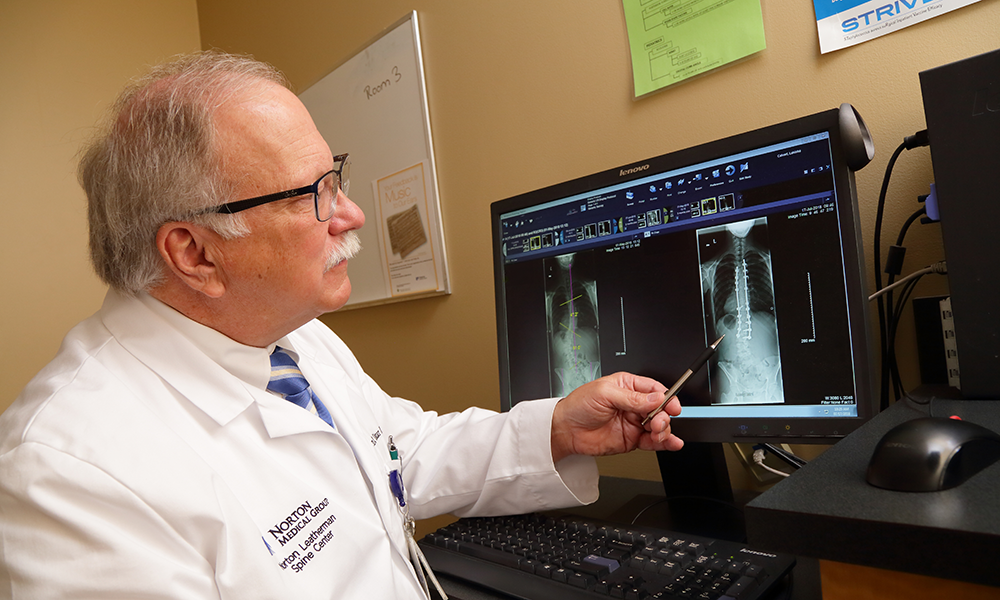If we confirm osteoporosis, we will counsel the patient about additional risk of adverse events and treat before surgery to optimize bone mineral density.

Osteoporosis in the aging population is now estimated to affect over 10 million people and significantly affects postmenopausal women, although the condition can occur in other groups. There are many predisposing factors, including a family history (genetics), race, smoking, alcohol abuse, chronic illness, cancer, deficient vitamin D3 levels and living a sedentary lifestyle. The condition of osteoporosis frequently is not recognized by health care providers, resulting in severe consequences — including fragility fractures involving the spine, hips, pelvis and forearms.
Many of the vertebral fractures require surgical stabilization and because of the patient’s bone quality have a significantly higher risk of postoperative adverse events, including instrumentation breakage and screw failure, pseudarthrosis (failure to fuse), and proximal junctional failure (adjacent level fractures). These complications can lead to potentially catastrophic spinal fractures and frequently are associated with concurrent neurologic injury. When a neurologic injury occurs, it often requires emergency surgery regardless of the bone quality, but in instances of an elective spinal issue, identification of the risk factors and appropriate treatment prior to surgery has been the focus of intense research to prevent these complications.
The Congress of Neurological Surgeons standing task force selected osteoporosis to evaluate the effect of the condition on elective spine surgery and posed two important preoperative questions to create guidelines for treatment:
- What preoperative diagnostic studies predict the risk of osteoporosis-related adverse events after spine surgery?
- Does preoperative treatment of low bone-mineral density predict the risk of osteoporosis-related postoperative adverse events after spine surgery?
I led a team of expert specialist spine surgeons as the lead author that formulated the CNS guidelines which specifically answered these two critical questions for other spine surgeons to consider prior to elective spine surgery. Over a period of two years we reviewed all available articles (284) that met the task force’s strict inclusion criteria, distilling them down to 17 quality articles that were used to formulate the final recommendations. The tasks force affirmed:
- A Grade B recommendation (second-highest on the grading scale) that preoperative osteoporosis testing with a dual-energy X-ray absorptiometry scan (DEXA: T-score less than minus 2.5), a CT scan (Hounsfield units less than 97.9) and a serum vitamin D3 level (less than 20 nanograms per milliliter) predicts an increased risk of osteoporosis-related adverse events after spine surgery.
- A Grade B recommendation that preoperative osteoporosis treatment with a teriparatide increases bone mineral density, induces earlier and more robust fusion, and may improve select patient outcomes. There is insufficient evidence regarding preoperative treatment with bisphosphonates alone and postoperative outcome.
Refer a patient
To refer a patient to Norton Leatherman Spine, visit Norton EpicLink and open an order for Spine Surgery.
Prior to issuing the guideline recommendations on elective surgery for patients with osteoporosis, there was a significant lack of attention in identifying the condition and controversy in initiating treatment, resulting in significant postoperative adverse events. The two Grade B recommendations are meant to clarify this controversy by presenting compelling evidence that identification and treatment of osteoporosis based on quality clinical studies that were reviewed by the CNS panel of expert spine surgeons is beneficial. This will benefit the providers not only in the identification and treatment of osteoporosis but allow for the careful planning, pre-treatment and counseling of their patients preoperatively concerning the importance of treatment of the condition — including the potential complications of not optimizing their bone heath prior to surgery.
The spinal surgeons at Norton Leatherman Spine, as part of their preoperative medical assessment, have for more than a decade been on the forefront in the identification and treatment of osteoporosis prior to elective spine surgery. Our center has a renowned, multidisciplinary team (including orthopedic spine surgeons, neurosurgeons, endocrinologists and nurse practitioners) to identify and initiate the treatment to optimize bone-mineral density prior to surgery to mitigate the postoperative complications. Patients identified as likely having osteoporosis and who do not need surgery, and those who don’t have a treatment plan initiated, especially those that require elective surgery, have recommendations for treatment relayed to their own health care provider. Prior to surgery all patients should have a FRAX questioner, vitamin D3 and calcium levels checked, a DEXA scan done and, if a CT of the spine is available, have their Hounsfield units measured. Lifestyle changes also should be addressed, including smoking cessation, curbing excessive alcohol and initiating exercise.
With the rapidly aging population in the United States, fragility fractures occur in 2.1 million patients annually, with 245,000 in the spine, are a major health issue causing significant morbidity. These CNS osteoporosis guidelines are extremely important in raising awareness in the entire medical community of this critical metabolic bone disease and guiding future multidisciplinary care. Patients should be educated that osteoporosis demands identification and may require regular, lifelong treatment similar to other major medical conditions such as hypertension and diabetes. The guidelines represent one of the first significant steps to improve the clinical identification and treatment of osteoporosis in our patients referred for spinal pathology consultation and elective surgical treatment.
Dr. Dimar is a spine surgeon with Norton Leatherman Spine.

